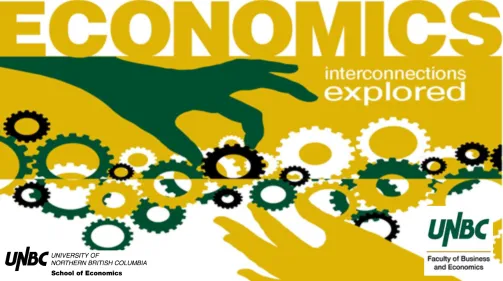Why Study Economics at UNBC?
Economics is the study of how societies allocate resources to promote well-being, now and for future generations. It explores the decisions made by individuals, businesses, and governments, and how those choices influence outcomes such as growth, inequality, sustainability, and quality of life.
At UNBC, our Economics programs provide a solid foundation in value theory, the principles that guide how we define and prioritize well-being, combined with applied tools for analyzing real-world challenges. You will gain the ability to connect theory to action in diverse contexts, from public policy to environmental economics.
Economists ask critical and timely questions, such as:
- How can economic tools support environmental sustainability and climate action?
- Does increasing the minimum wage reduce poverty?
- What is the best way to manage natural resources or reduce carbon emissions?
- Does economic growth always lead to improved well-being. or what are the trade-offs?
- How do global markets and local economies interact in a rapidly changing world?
At UNBC, we recognize that economic systems are influenced by broader social, political, cultural, and environmental forces. Our students graduate with the skills and the perspective to apply economics thoughtfully and effectively to today’s complex challenges.
What Can You Do with a Degree in Economics?
A degree in Economics from UNBC prepares you for a wide range of careers—and for advanced study in economics and related disciplines. Employers value the analytical, quantitative, and policy-oriented skills that economics graduates bring to the table.
Graduates from our program pursue careers in:
- Government and public service: Policy analysis, statistics, economic development, and planning at federal, provincial, and municipal levels
- Environmental and sustainability sectors: Working on climate policy, energy transitions, and sustainable resource management.
- Private sector: Including roles in finance, consulting, investment, and market research.
- International organizations and NGOs: Such as the United Nations, World Bank, and environmental advocacy groups
Our graduates go on to pursue graduate studies in Economics, Public Policy, Law, Business, Environmental Studies, and other interdisciplinary fields, continuing their academic journey at leading institutions across Canada and beyond.
Explore where UNBC Economics can take you
Visit our Alumni Success Stories to learn how our graduates are making an impact in the workforce and in graduate programs around the world.
Start your journey in Economics at UNBC - check out our brochure!
